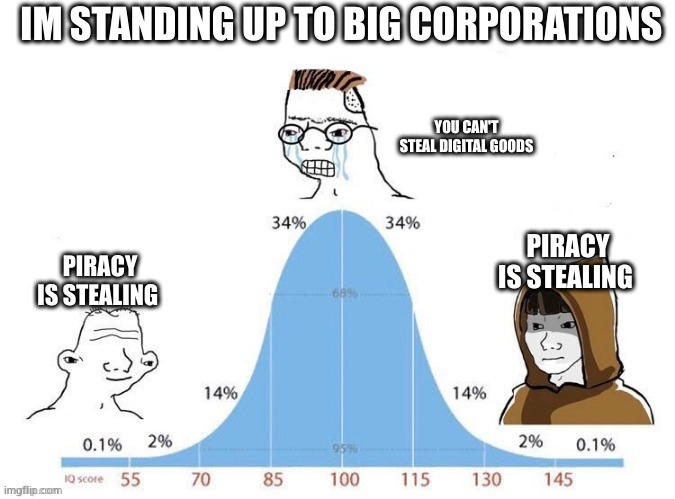Embedding image directly for mobile users:

Is this the same way for memes in comments?
Someone: Photographs pages of a book in a book store
OP: “Hello Police? Someone is stealing a book!”
Nicholas Cage heavily breathing about all the people simultaneously stealing the declaration of independence
Brb, stealing some documents…


My evil plans are already underway. MUHAHAHAHA
Jokes on you I just downloaded those pictures and if you want them back you must give me 1 million upvotes
Noooo, you can’t just steal MY Declaration of Lemmy Independence that I
stoledownloaded. Hello, Lemmy Police? This fucking Lemming just stole MY document!Blast! My evil plans are foiled!
Don’t make me tap the sidebar again…
You can steal digital goods, but to do so you have to copy it and erase the original. Otherwise its just copying.
That’s dumb. If you are supposed to pay for something and you just take it instead, you stole it. You can argue word meanings and technicallies all day, but it’s a lot easier to just be real about what we are doing here.
By your own definition, if you TAKE it, you stole it. Nothing is taken.
It is copyright violation, not stealing. Yes, it is damaging to the content creator, under current economic and law structure, but it is not stealing. If you burn a house belonging to the content creator, you do not call it stealing, just because it is damaging to them. So, why do you insist on calling it stealing here?
On a side note, one can incision a society where there is no copyright. In that society it would be completely lawful and “non-damaging” to copy things. Copyright is an artificial construct that we choose to have, but it does not mean that we can not rejected (we, as in the whole society, not individual)
We’re talking about the crime of theft and the civil offense of copyright infringement. There is no argument about word meanings or technicalities, just what the law actually says.
Media companies want copyright infringement to be considered theft, and they’ve lobbied the government to try and change the definition in their favour, but the fact is the law distinguishes between them. Copyright infringement is wrong, but it is not a crime and nor is it theft.
If you’re selling apples, and I steal and eat an apple, that’s theft. You no longer have an apple, you had a cost price for that apple and you can’t sell it anymore to make the profit you would have made. Meanwhile, if you sell a game and I copy that game, you still have your original copies. Yes, you haven’t had the money I might have paid for a copy, but it hasn’t cost you anything and you still have an infinite number of copies to sell. If I was never going to buy the game from you anyway, then you wouldn’t have even got that either way.
The US is weird though, in that the courts award statutory damages for copyright infringement. If you fileshare a few songs to a pool of users they might stack up the fines for each user you shared to up to hundreds of thousands of dollars - nevermind that they never would have made that money from selling to all of those people you shared it with. In the rest of the world, they deal with actual damages, and claims for copyright infringement were rarely if ever very large.
If you stole a car, you physically took something away from somebody. If you download a car, the original is still there - you’re just making an exact copy for yourself for free. Same if you swiped a candy bar at a gas station - you’re depriving that gas station the use of their property, which is to sell and make money. If you download a candy bar, nothing is taken and the gas station can still sell the original.
So let’s be crystal clear here: what’s happening is not theft, because nothing was taken and the owner is not deprived of the use of their property. Can you argue that you’re getting something for free when you shouldn’t? Yes, and that’s more in line of denying profits rather than actual theft.
🤡
It’s a lot earlier when you realize that everyone else is going to treat this world like a smash and grab regardless of what you do. These companies
includedespecially.deleted by creator
Which is why I think it is probably more immoral to play by their rules. But in the end I pirate cause I’m poor.
I don’t know man. Where I live the law says it’s not stealing. It says: legal to share, illegal to share for profit. On other words: legal to share, illegal to sell.
Or you could just not give a flying fuck about the moral and ethical aspects and go on with your life.
Live the unexamined life? But then who will pay attention to me?
Talk about blowing smoke up your own ass.
If no one loses anything they never had in the first place it is not stealing
“But I want to support those little poor billionares, who’s going to look after their livehood and ethical buisness?”
The more you pay for big brands, whatever product you buy, be it clothes, food, or any form of knowledge, the more you drive up the sales, the more you reinforce the idea that money is a tool only a few chosen are rightful of having, just like the riches and the labour of the many. (Buy from local producers as much as you can)
Ironically enough, pirating makes people more aware of what it consumes, what labor is and mostly to get to support creators directly for what they put out. You can’t steal from corporations, you only get back the unpaid /underpaid labour of many. Quality content and effort should be rewarded, so please support/help your creators in any way you can.
I’m so split on this as a person who has dated (for a long while) a guy who works in wardrobe on film and TV sets. Yes i still pirate, but i also buy the things i love and appreciate. I know those sales go into his pay and unfortunately those billionaires pockets.
Piracy explicitly is not stealing. Theft requires denying the owner of the ability to use the thing that is stolen. Copyright infringement does not meet this bar, and is not a crime in the vast majority of cases. Commercial copyright infringement is the only offense classed as a crime, which in a nutshell is piracy for profit ie selling pirated material.
Piracy explicitly is not stealing.
Piracy is attacking ships at sea and is usually done in order to rob them.
And privateering is piracy when you have the consent of a government to attack ships belonging to another government
This is why you get a letter of marque to give you legitimacy. I’ve been letioning my government for one endlessly so I can attack Russian shipping in the balkans.
Piracy is best compared to riding a bus without a ticket.
Regardless of the semantics of what we call theft, or whether theft requires denying somebody access to some good, there’s an ethical issue with copying other people’s stuff without permission. If a person breaks into another persons home and makes copies of all of the documents in their home private or otherwise, they’ve at least committed a crime in the form of breaking and entering. But if a person is invited into another persons home, and then without pemission copies all of the documents in the house, that still feels like a wrong act? Like, if you invite me into your house and I start copying down your personal journal, your family photos and other stuff you have lying around, to me that sounds like I’d be doing something wrong by you?
Edit: I do want to point out here that I’m not saying piracy is inherently wrong/bad or never justified.
Sure, but breaking and entering is a crime - just like theft. Copying someone’s documents is wrong, but it’s not a crime (not unless you commit a crime with those documents, eg fraudulently take out credit). In that case, it’s a civil offense against the victim - just like copyright infringement.
Crimes are prosecuted by the government. To be convicted of a crime you have to be proven guilty beyond reasonable doubt - in other words, it’s more than 99% likely you did it.
Civil offenses are prosecuted by the victim. The burden of proof is “the balance of probabilities”, ie it’s more than 50% likely you did it. The victim must also show actual damages.
In the US, media companies have perverted the law around copyright infringement, and they manage to get awarded statutory damages well in excess of any actual damages they incur. This is why we had all those ridiculous Napster lawsuits where people were fined hundreds of thousands for downloading a handful of songs. In the rest of the world, they could only be awarded actual damages, and the lawsuits weren’t really worth anything.
Media companies would really like copyright infringement to be theft, and they’ve lobbied hard for that. However they haven’t managed it, not yet anyway. They did manage to establish a crime of commercial copyright infringement, though, where if you pirate a significant amount of material or do it for profit you could be criminally charged.
Very strange comparison, those private copies are specifically private. If you want our comparison to work, I’d be selling these private documents to others… Making them not very private.
My example doesn’t require a “for sale” vs not distinction so I’m not sure why you’re imposing that property on it? People pirate unreleased media, unofficial media, bootleg media and other forms of media that aren’t for sale already, so being for sale is definitely not a necessary property of the cases we’re concerned about when we’re talking about the ethics of piracy.
And even if we restrict ourselves to talking about things that are already for sale: 1. Why does something being for sale suddenly make it not private? Many things for sale are already certainly not public. 2. Why does something being for sale suddenly make taking it without permission magically morally acceptable?
I’m imposing that property on it because for the overwhelming majority of media that is absolutely the case.
-
If it’s for sale it’s something you do not mind other people seeing. My documents I do not sell because I don’t want people seeing it. If I were to sell them, clearly I don’t mind people seeing it.
-
Making it for sale means you intend to share it, even if conditionally. Also “taking it” doesn’t apply, making a copy isn’t taking anything.
I’m imposing that property on it because for the overwhelming majority of media that is absolutely the case.
I don’t see why this is such a necessary property of media? Arguably there could be more media inside peoples private homes and hard-drives that is not for sale than media that is for sale. On top of that, this kind of thing depends on how we define media, we can take more or less inclusive definitions of this term.
It should also be clear that the kinds of things that I’m talking about in my original post refers to more than just movies, music, games and software (despite me using “media” as a convenient example in my previous post).
If it’s for sale it’s something you do not mind other people seeing. My documents I do not sell because I don’t want people seeing it. If I were to sell them, clearly I don’t mind people seeing it.
I don’t agree. I’d bet a lot of people are willing to sell plenty of ordinarily private things given a high enough price. I don’t think the notion that something is for sale all of a sudden makes that thing magically not private? When you sell something you don’t always make the thing you’re selling available to the public, just to the buyer, and until the sale is complete you’re not typically giving anybody full access to the thing. If it were public/not private the minute you made it for sale, then what is the point in selling it?
Making it for sale means you intend to share it, even if conditionally. Also “taking it” doesn’t apply, making a copy isn’t taking anything.
This isn’t true either. Sometimes people make things for sale with no actual intent of selling. And the intent to share, does not make something all of a sudden not private either. You might share something (perhaps a secret) with a friend, that doesn’t mean the thing you are sharing suddenly becomes not private/public, but that the scope of people you’re will to share this thing privately with has increased by a small amount.
I also disagree with the notion that making a copy just inherently isn’t “taking” things. This is also a matter of definitions, but people actively use the word “taking” to encompass more than just physical things. Phrases like “he took my idea”, “she took my credit card information” and so on are examples of this. Obviously people do consider “taking” to include acts of copying in some cases. If you mean something else by taking, that’s fine, but your personal definition for taking isn’t really relevant when the point I’m making regards a more inclusive notion.
If you’re talking about having family photos pirated, there’s a privacy issue, not a property issue. Everyone talking about media in privacy talks about distributable media. If you want to include other things, that’s on you, but you’ll be yapping in the void as that isn’t what the conversation is about. Not secrets, or private documents.
As for the term of taking, it’s clear what taking means when you try to erroneously conflate piracy with stealing. It doesn’t mean the same as taking a shit either, it has nothing to do with personal definitions, merely the accepted definitions when talking about either piracy, or stealing.
If you’re talking about having family photos pirated, there’s a privacy issue, not a property issue.
It’s pretty clear that I’m talking about more than just family photos. It’s also pretty clear that what I’m saying is that privacy problems are one of possibly many issues with copying data without permission. My actual point here from the start has been that it’s not always ethical to copy other people’s data without permission.
Everyone talking about media in privacy talks about distributable media. If you want to include other things, that’s on you, but you’ll be yapping in the void as that isn’t what the conversation is about. Not secrets, or private documents.
All of the types of media and data I’m talking about are distributable in a colloquial sense. This conversation is about the fact that copying data without permission isn’t always ethical. The data we’re talking about here absolutely includes secrets, private documents and so on.
As for the term of taking, it’s clear what taking means when you try to erroneously conflate piracy with stealing. It doesn’t mean the same as taking a shit either,
I don’t think that’s what’s happening. I’m talking about the ethics of copying data. Perhaps sometimes copying data can be considered theft, but whether or not copying data is theft, has nothing to do with my point. A thing being called theft doesn’t make that thing morally wrong or right. The term theft itself has little to do with the actual issue we’re talking about.
Also, I’ve never actually claimed piracy is theft. I’m also not claiming piracy is morally wrong, or even that theft is inherently morally wrong for that matter (a person can be justified in stealing in some cases).
it has nothing to do with personal definitions, merely the accepted definitions when talking about either piracy, or stealing.
Lets assume you’re right and that literally everybody in the world uses these words the way you do (they don’t). I don’t think arguing “but that word means…” makes a very good argument against the fact that copying data from other people just isn’t always morally right. The fact that you don’t like how I use certain words is just not a good argument against what I’m saying. If you understand what I mean and you disagree with what I’m saying, then why not argue against my point instead of complaining about the fact that you don’t like HOW I use certain words? If you understand what I’m saying and you agree that sometimes it’s wrong to copy other peoples data without permission, then why are we still discussing this?
-
that’s an interesting definition, and one that appeals to me especially as a fan of “harmless” theft (taking something that the owner will never notice is gone, nor be inconvenienced by the lack of)
It’s literally the legal definition. Copyright infringement has never been theft. Media companies have been trying to change the definition of theft, though.
It used to never be a crime, only a civil offense. This means the rightsholder has to sue you, rather than the state prosecute you, but also that the burden of proof is “the balance of probabilities”, ie whichever side tips the scale past 50/50 with their argument, rather than “beyond reasonable doubt” which is more like >99%. However in the last decade many countries have introduced “commercial copyright infringement” as a criminal offense. Off the top of my head, in the US I think the threshold for that is like $1,000 or something.
It’s not about it being “harmless” but the fact that you’re not taking something away from someone. If I steal your laptop and sell it, you no longer have a laptop. If I copy data, you still have your original copy.
This is also why there’s a different crime for “joyriding” instead of just stealing a car. If you steal a car, you might argue that you were just taking it for a drive, and never intended to permanently deprive the owner. In that case it’s easier to convict you for joyriding instead of theft.
Piracy is stealing- but so is capitalism so it’s fine.
I live on a small island and the closest cinema or shop where I could buy anything is 3 hours away.
Piracy is more comfortable for me.
then why don’t you subscribe to streaming services?
Well, my friend: I don’t like to be locked out of other regions.
small island
3 hours away
Hmmmmmmmmmmmm
Trying to locate me? 😁
I am proud of pirating and I don’t get why people who also pirate would have a problem with that. Like you think it’s wrong and do it anyway, but think people who don’t think it’s wrong are cringe somehow? What’s wrong with standing up for what you believe in?
Yep, I pirate for the same reason my dog licks his balls… because we can
i disagree. not that i would care anyway
















